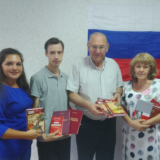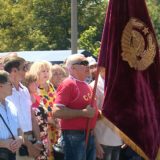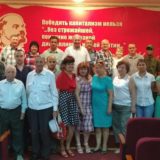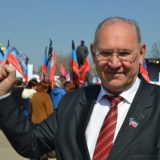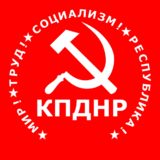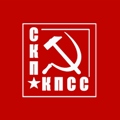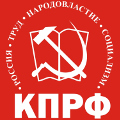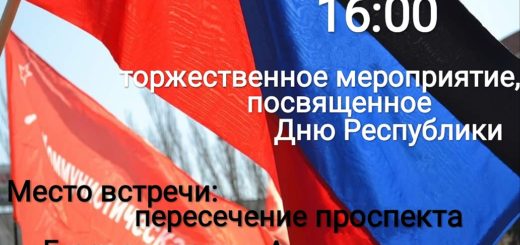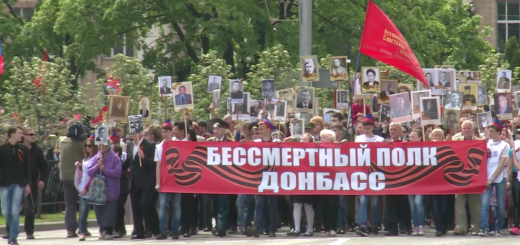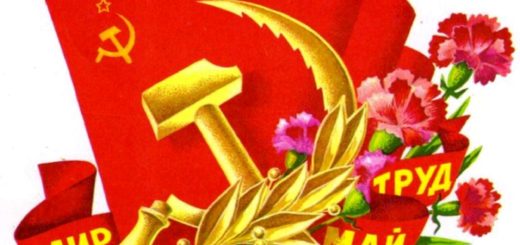In February 2014, a U.S.-backed coup overthrew the elected government of Ukraine and installed a far-right regime representing Western imperialist interests, local oligarchs and neo-Nazis. The new government launched a war against the rebellious Donbass mining region in mid-April 2014, which to date has cost at least 13,000 lives. People in Donbass declared independence, creating the Donetsk and Lugansk People’s Republics (DPR and LPR).
As part of a series of interviews marking five years of the anti-fascist struggle in Ukraine and Donbass, Struggle-La Lucha spoke with Stanislav Retinsky, secretary of the Central Committee of the Communist Party of the Donetsk People’s Republic (KPDPR) and an editor of the party’s publication, Forward.
Struggle-La Lucha: It’s been five years since the beginning of Ukraine’s war against Donbass. What role did the communists of Donetsk play in the early days of the anti-fascist resistance and the independence struggle?
Stanislav Retinsky: The communists did a lot to create the Donetsk People’s Republic. For example, Boris Litvinov, who was then the first secretary of the Kirovsky District Committee of the Communist Party of Ukraine, and now the first secretary of the Central Committee of the Communist Party of the Donetsk People’s Republic, authored the Act and Declaration of Independence of the DPR. Anatoly Khmeleva, the first secretary of the Slavyansk City Committee of the Communist Party of Ukraine, and now the second secretary of the Central Committee of the KPDPR, took part in the battles for Slavyansk.
Election commissions were created with the active participation of the communists, thanks to the presence of party organizations throughout the Donbass region, facilitating the referendum held on May 11, 2014 [when the vast majority of voters supported independence from Ukraine – SLL]. More than 20 of the 98 deputies in the first Supreme Council of the DPR were communists.
Today a significant part of our work is aimed at international recognition of the DPR. This can be achieved, in particular, through the establishment of international party relations. And the Communist Party has made significant strides in this direction. In addition to the United States, we were able to establish contacts with communists in more than 15 countries of the European Union, Latin America (Venezuela, Cuba, Nicaragua), Asia (Vietnam, India, North Korea) and, of course, the former USSR.
Throughout these five years, the Communist Party has worked in difficult conditions, but today its position has deteriorated markedly. The revocation of the registration certificate issued by the Central Election Committee in 2014 means the KPDPR is prohibited from appearing on the ballot. The Communists of the Donetsk People’s Republic intend to seek the repeal of the CEC decision in court.
SLL: I understand you’ve recently written a book. What’s it about?
SR: The book is called “Donbass in the World Confrontation: A Class Approach.” It presents a Marxist viewpoint on the conflict in the Donbass. Contrary to the well-established view that this is a struggle for the interests of the “Russian world,” I give a different interpretation of what is happening.
In my opinion, the Donbass is part of the anti-imperialist front (at least until the death of the first head of the DPR, Alexander Zakharchenko), along with Syria, Venezuela and other regions. Ultimately, they are all resisting U.S. imperialism. The book not only describes the situation in the Donbass, but on the basis of this, explains the tactics of the Communist Party, which were developed taking into account the experience of previous generations of communists.
The work itself is dedicated to Vsevolod Petrovsky — a communist who died in the battle for the liberation of Debaltsevo in February 2015.
SLL: Last year, there were big changes in the leadership of the Donbass republics. The Minsk negotiations stalled long ago. Ukraine has concentrated large forces near the combat zone, but so far there hasn’t been a new military offensive. How do you assess the political and military situation today?
SR: For the last four years, since the signing of the second Minsk agreements in February 2015, the Donetsk People’s Republic has been in a state of “neither war nor peace.” In other words, there is no full-scale war on the territory of Donbass, but shelling by the Armed Forces of Ukraine continues to this day.
To properly assess the current political situation in the republic, we must remember that politics is a concentrated expression of economics. After the death of the first head of the DPR, Alexander Zakharchenko, significant changes took place.
The driving force in the confrontation in the Donbass was the petty bourgeoisie, which sought to win the market from big capital. Alexander Zakharchenko, who also came from the petty-bourgeois strata, led this movement. But to win back the market from the Ukrainian oligarchs, it was necessary to challenge the imperialist group that was behind them. Consequently, the first head of the DPR, whether he wanted to or not, was forced to lead an anti-imperialist struggle.
For a while, it was possible in the DPR to realize the petty-bourgeois ideal of preserving market relations, only without oligarchy. But without moving forward — that is, without moving towards socialism — a return to the exploitation of the working people by big capital is inevitable.
Now Sergey Kurchenko [a rising oligarch known as the “Gas King of Ukraine” – SLL] is trying to establish control over the market won from Rinat Akhmetov, the oligarch who formerly dominated the Donbass. He made repeated attempts to take control over the export of coal and metal from the DPR. Alexander Zakharchenko tried, at least, to limit these aspirations.
Today, by all appearances, the position of Sergey Kurchenko in the Donbass is noticeably stronger, and consequently, we can speak about the end of the period of anti-imperialist struggle.
SLL: Where does that leave the workers’ and left movements in the DPR?
SR: One of the main problems of all the communist parties of the former Soviet Union is the lack of a strong connection with the proletariat. Donbass is no exception.
The last time the local working class manifested itself politically as an independent force was in the late 1980s-early 1990s, when it opposed the Soviet government. Then, the local miners held mass rallies, speaking essentially for a change in property relations. And anti-Soviet views are still quite common among the workers.
Nevertheless, since the beginning of 2014, the Donetsk communists have been carrying out propaganda and organizational work in the proletarian milieu.
The DPR communists took part in organizing the largest demonstration of miners, which took place in Donetsk on May 28, 2014. About a thousand miners marched in protest against Ukraine’s “anti-terrorist operation” in the Donbass. This happened two days after the bombing of the city by Kiev’s fighter planes.
The fighting significantly increased the danger of an emergency situation in the mines and factories. A shell hitting a utility substation means inevitable death for the miners, so they took to the streets in protest.
In November 2015, in Khartsyzsk, with the participation of the local city committee of the Communist Party, a rally of workers of the pipe plant was held, opposing the closure of the enterprise, which at that time belonged to Rinat Akhmetov.
The chairperson of the Union of Transport Workers is the second secretary of the Communist Party, Anatoly Khmeleva. Under his leadership, the union has been able to repeatedly defend the interests of the drivers.
SLL: How does the economic blockade imposed by Ukraine and the Western powers affect the workers?
SR: Despite the fact that several dozen truces were signed in Minsk within the framework of the Contact Group, the Ukrainian side continues to bombard the territory of the republics. Of course, this has a negative effect on the local economy.
Because of the blockade and the incessant shelling by Kiev, many enterprises either stand idle or operate at a low capacity. All this affects the people’s standard of living. In the DPR, you can find a job, but it is usually low paid. Social benefits are at the same low level — they are several times lower than in Russia. At the same time, food prices in Donetsk are about the same as in Moscow.
However, in the DPR humanitarian aid is given to those in need, tariffs for utilities have not increased, and the price of public transportation remains low.
In early 2017, the economic blockade of Donbass sharpened greatly. Today, almost nothing passes from Ukraine to Donbass or from Donbass to Ukraine. Nevertheless, the products of the DPR and the LPR, in particular coal, are supplied to foreign markets. Raw materials from the republics reach European countries through the Russian ports in the Rostov region. Donbass coal is better and cheaper than North American, African or Australian.
SLL: What assistance can the international solidarity movement provide? How can workers and leftists in the U.S. help people in the Donbass republics?
SR: It’s very important for the people’s republics of Donbass that there is an alternative point of view presented at the international level. To do this, it’s necessary to regularly hold various activities in support of the DPR and the LPR, report on the situation in the Donbass, and provide humanitarian assistance to children, the elderly and people with disabilities.
Only by joint efforts can we resist world imperialism, which must be answered with proletarian internationalism. And we, the communists of the DPR, are glad that a movement for solidarity with Donbass exists in the U.S. Thank you, comrades!
Greg Butterfield

